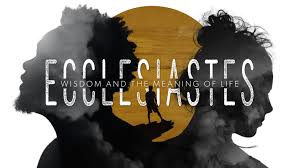Ecclesiastes:
Finding Joy within the Frustrations of Life
1:1 to 12:14

In the main body of Ecclesiastes, the Teacher himself comes onto the stage, introduces himself and his quest for meaning, and then proceeds to scrutinize different aspects of life and experience to see if meaning is to be found. In the light of his independent search for this meaning, he keeps coming to the conclusion that all is pointless (to see link click Ah – The Message of Ecclesiastes). Regularly this conclusion is contrasted with the “Let us eat and drink, for tomorrow we die (Isaiah 22:13; First Corinthians 15:32)” passages, which call to mind the joyful appreciation of life that he had learned from his Jewish roots. The contradictory contrast that results from this opens up gaps in the reading, gaps that indicate the excruciating tension emerging from the Teacher’s journey of exploration. Breakthroughs occur in 5:1-7 and 7:23-29, but in both cases the breakthroughs, which illuminate the independent nature of the Teacher’s search for meaning, are followed by passages full of despair and struggle. Resolution comes in 12:1-7 through “remembering” and “rejoicing” . . . but not apart from the struggles of life itself.236



Leave A Comment